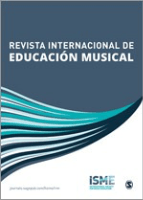
Revista Internacional de Educacion Musical
Scope & Guideline
Fostering interdisciplinary dialogue in the vibrant world of music education.
Introduction
Aims and Scopes
- Music Education and Human Rights:
The journal explores music education as a fundamental human right, highlighting its importance in social inclusion, cultural identity, and personal development. - Technological Integration in Music Education:
Research examining the use of technology in music teaching, such as online platforms and digital tools, is a key focus, reflecting the ongoing evolution of educational methodologies. - Inclusive Practices in Music Education:
A significant aim is to address inclusivity, particularly how music education can support diverse learners, including those with disabilities or from marginalized communities. - Cultural Contexts in Music Teaching:
The journal emphasizes the importance of cultural relevance in music education, investigating how traditional and contemporary musical practices can be integrated into curricula. - Teacher Training and Professional Development:
Research on the competencies required for music educators, particularly in initial training and ongoing professional development, is a consistent theme.
Trending and Emerging
- Global Competencies in Music Education:
There is a growing emphasis on developing global competencies among music educators, aligning music education with broader educational goals such as human rights and social justice. - Music and Mental Health:
An emerging theme is the connection between music education and mental health, exploring how music can serve therapeutic and developmental purposes for children and adolescents. - Interdisciplinary Approaches to Music Education:
Recent studies indicate a trend towards interdisciplinary methodologies, integrating music education with fields such as psychology, sociology, and technology. - Ethical Considerations in Music Teaching:
The exploration of ethics and values in music education practices is gaining traction, reflecting a broader societal concern for ethical standards in education. - Impact of Music Technology on Learning Outcomes:
Research focusing on the impact of music technology—such as virtual learning environments and digital tools—on student engagement and learning outcomes is increasingly prominent.
Declining or Waning
- Historical Perspectives in Music Education:
There is a noticeable reduction in studies focusing on historical methodologies and perspectives, suggesting a shift towards contemporary issues and practices. - Traditional Assessment Methods:
Research on conventional assessment techniques in music education has decreased, indicating a potential move towards more innovative and holistic evaluation methods. - Regional Studies in Music Education:
Although regional studies have been significant in the past, there seems to be a waning interest in localized music education issues, possibly overshadowed by global themes.
Similar Journals
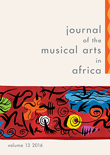
Journal of the Musical Arts in Africa
Illuminating Africa's Musical TapestryThe Journal of the Musical Arts in Africa is a premier academic publication dedicated to exploring the rich and diverse musical traditions of the African continent. Published by ROUTLEDGE JOURNALS, TAYLOR & FRANCIS LTD, this journal offers a vital platform for researchers, professionals, and students in the field of musicology. With an ISSN of 1812-1004 and E-ISSN of 2070-626X, the journal has established itself as a significant contributor to the scholarly discourse surrounding African musical practices. With an impact factor reflecting its growing influence, the Journal of the Musical Arts in Africa is categorized in the Q3 quartile of music journals according to the latest metrics, placing it among an essential cadre of publications in the field. The journal invites original research articles, reviews, and critical essays that aim to expand the understanding of music as an integral part of African culture. It has been continuously publishing since 2004 and encompasses a wide range of topics, making it a must-read for anyone interested in the intersections of music, culture, and identity on the African continent. The journal stands as a testament to the vibrant musical heritage of Africa and encourages scholarly contributions that highlight the importance of music in reflecting and shaping societal values.

MUSICAL TIMES
Empowering the Next Generation of Music ScholarsMUSICAL TIMES is a distinguished journal dedicated to the exploration and dissemination of scholarly works in the realm of music, serving as an essential resource for researchers, professionals, and students alike. Published by MUSICAL TIMES PUBLICATIONS LTD, this journal has built a robust reputation within the arts and humanities, specifically focusing on music studies, with an impactful reach indicated by its Scopus ranking at #73 out of 106 in the field. Though access to this journal is not open, its curated content, which spans various facets of musicology and contemporary music discourse, enriches the academic community by encouraging insightful discussions and critical analyses. With its historical roots tracing back to its inception, MUSICAL TIMES aims to foster a deeper understanding of music's cultural, social, and artistic dimensions, making it a valued publication for those engaged in the scholarly pursuit of music.
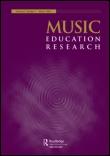
Music Education Research
Inspiring Change in Music Learning EnvironmentsMusic Education Research is a prestigious journal dedicated to advancing scholarship in the field of music education, published by Routledge Journals, Taylor & Francis Ltd. With a significant impact factor reflected in its Q1 ranking in Music and Q2 in Education for 2023, this journal is a critical resource for researchers, educators, and practitioners alike. It consistently ranks high in both the Arts and Humanities and Social Sciences categories, with an impressive position of Rank #8 in Music out of 180 journals, indicating its influence in shaping contemporary discourse. Aimed at fostering innovation and critical examination within music education, Music Education Research invites submissions that explore a broad spectrum of topics, encompassing pedagogical practices, policy implications, and curriculum development. Operating from the United Kingdom, the journal provides a vital platform for sharing cutting-edge research and is committed to improving music learning experiences across various educational contexts.

Revista de Musicologia
Advancing the Discourse in Music StudiesRevista de Musicologia is a distinguished academic journal dedicated to the exploration and analysis of musicology, published by the SOC ESPANOLA MUSICOLOGIA. Based in Spain, this journal serves as a vital platform for music scholars, researchers, and enthusiasts to share innovative insights and original research concerning various aspects of music, including historical studies, ethnomusicology, and contemporary critiques. With its ISSN 0210-1459 and a current Scopus ranking placing it in the Q3 quartile of Music studies, the journal reflects a commitment to enhancing the discourse in this rich field. Although it currently does not publish under an open-access model, it continuously aims to provide a rigorous peer-reviewed environment for contributions that engage both academic inquiry and practical applications within musicology. The Revista de Musicologia is thus an essential resource for anyone in the field looking to expand their understanding and expertise in music studies from 2016 through 2024 and beyond.

Problemy Muzykalnoi Nauki-Music Scholarship
Pioneering Research in the Realm of Music ScholarshipWelcome to Problemy Muzykalnoi Nauki-Music Scholarship, a leading journal in the field of music scholarship published by the esteemed Gnesin Russian Academy of Music. With an ISSN of 2782-358X and an E-ISSN of 2782-3598, this Open Access journal has been committed to the dissemination of high-quality research since 2009, making scholarly work accessible to a global audience. Covering diverse aspects of music theory, history, and its socio-cultural impacts, Problemy Muzykalnoi Nauki serves as an essential platform for scholars, educators, and practitioners in the arts and humanities, as well as in social sciences related to music education. While its Scopus coverage was discontinued in 2021, the journal remains influential, holding a rank of #48 in the Arts and Humanities category and a percentile of 67th, showcasing its relevance and rigor in the discipline. We invite researchers and students alike to explore the rich contributions made within these pages, fostering a deeper understanding and appreciation of music in contemporary society.
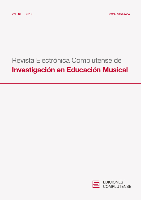
Revista Electronica Complutense de Investigacion en Educacion Musical-RECIEM
Empowering Educators through Innovative Music PedagogyRevista Electronica Complutense de Investigacion en Educacion Musical (RECIEM) is a distinguished open-access journal published by UNIV COMPLUTENSE MADRID, SERVICIO PUBLICACIONES, dedicated to advancing research in the fields of music education and pedagogy. Since its inception in 2004, RECIEM has provided a vital platform for scholars, educators, and researchers to disseminate their findings and foster discussions that bridge the gap between theory and practice in music education. With an impressive ranking in the top quartile for music (Q1) and a respectable Q3 ranking in education for 2023, RECIEM is a pivotal resource for those engaged in the interdisciplinary nexus of arts and education. The journal's commitment to open access ensures that its scholarly content is available to a global audience, enhancing its impact and fostering collaboration among professionals in the music education community. The journal covers diverse topics within music and education, aiming to inspire innovation and reflect contemporary developments in teaching methodologies and musicological research. RECIEM’s continued growth—represented by its robust Scopus ranks and the convergence of years from 2004 to 2024—underscores its relevance and significance in shaping the future of music education research.

Musica Oral del Sur
Celebrating the Rich Tapestry of Southern SoundscapesMusica Oral del Sur is a prominent academic journal published by the Junta Andalucía through the Centro Documentación Musical Andalucía. With its ISSN 1138-8579 and E-ISSN 2445-0391, this pioneering publication has championed open access since 1995, providing a vital platform for scholars dedicated to the exploration of traditional and contemporary oral music practices in Southern Spain and beyond. The journal is essential for researchers, professionals, and students interested in musicology, ethnomusicology, and cultural studies, promoting scholarly discourse through a rich assortment of articles, reviews, and field research. Set in the vibrant cultural landscape of Granada, the journal encourages the fusion of theoretical insights with practical implications, making significant contributions to the understanding of oral musical traditions. By fostering accessible academic dialogue, Musica Oral del Sur plays an invaluable role in preserving and highlighting the heritage of Southern musical expressions while addressing contemporary issues in the field.

Musicologica Brunensia
Connecting Passionate Minds Through Music ResearchMusicologica Brunensia, an esteemed journal published by Masaryk University, Faculty of Arts, serves as a significant platform for the dissemination of knowledge in the field of musicology. Based in the Czech Republic, this Open Access journal has been facilitating scholarly communication since 2009, allowing unrestricted access to its rich array of research articles. With an ISSN of 1212-0391 and an E-ISSN of 2336-436X, Musicologica Brunensia proudly holds a Q3 ranking in the Music category as of 2023, reflecting its dedication to advancing research in the arts and humanities, particularly music. The journal accepts contributions spanning diverse topics within music studies, fostering interdisciplinary dialogue among researchers, professionals, and students alike. Located at Arne Novaka 1, Brno, 60200, Czech Republic, Musicologica Brunensia is poised to continue its journey of promoting innovative scholarship in musicology until 2024 and beyond, making it a valuable resource for anyone passionate about the field.
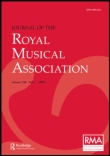
JOURNAL OF THE ROYAL MUSICAL ASSOCIATION
Illuminating the rich tapestry of musical history.JOURNAL OF THE ROYAL MUSICAL ASSOCIATION, published by Cambridge University Press, stands as a significant repository for innovative research and scholarly discourse within the field of music studies. Recognized for its contributions to the understanding of musical practices, theory, and history, this esteemed journal offers a platform for academics and researchers to disseminate their findings to a broad audience. With an ISSN of 0269-0403 and E-ISSN of 1471-6933, the journal has maintained a notable presence since its inception, merging insights from both traditional and contemporary musicology. It currently occupies a Q4 ranking in Music within the Scopus database, reflecting its inclusion within the arts and humanities landscape. While the journal traditionally operates under subscription access, its continuing commitment to advancing music scholarship ensures that it remains an essential resource for students, scholars, and practitioners alike, fostering greater understanding and appreciation of musical artistry from 1987 to the current era.
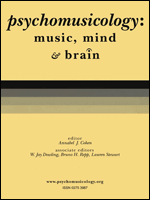
Psychomusicology
Transforming Understanding Through the Science of SoundPsychomusicology is a premier journal dedicated to the interdisciplinary exploration of the intersection between psychology and music. Published by the American Psychological Association, this esteemed publication serves as a vital resource for researchers, professionals, and students keen on understanding the profound impact of music on human cognition, emotion, and behavior. With a commitment to publishing high-quality research, Psychomusicology offers insights into diverse topics ranging from music perception and performance to the therapeutic applications of music. By fostering a community of scholars interested in the psychological aspects of music, the journal aims to advance empirical research and stimulate innovative thinking in the field. The ISSN for print is 0275-3987, while the electronic version can be accessed under E-ISSN 2162-1535. Unfortunately, the journal currently does not offer Open Access options, but it remains an essential reference for those engaged in the psychological and musical disciplines, promoting an enriched understanding of how music shapes the human experience.